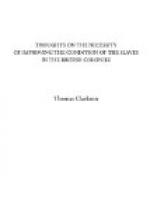voluntarily on board the ships which took them
from their native land; and secondly, that they were
conveyed to the Colonies principally for their own
benefit, or out of Christian feeling for them,
that they might afterwards be converted to Christianity.
Take as an instance of the first assertion, the way
in which Queen Elizabeth was deceived, in whose reign
the execrable slave trade began in England. This
great princess seems on the very commencement of the
trade to have questioned its lawfulness. She seems
to have entertained a religious scruple concerning
it, and indeed, to have revolted at the very thoughts
of it. She seems to have been aware of the evils
to which its continuance might lead, or that, if it
were sanctioned, the most unjustifiable means might
be made use of to procure the persons of the natives
of Africa. And in what light she would have viewed
any acts of this kind, had they taken place to her
knowledge, we may conjecture from this fact—that
when Captain (afterwards Sir John) Hawkins returned
from his first voyage to Africa and Hispaniola, whither
he had carried slaves, she sent for him, and, as we
learn from Hill’s Naval History, expressed her
concern lest any of the Africans should be carried
off without their free consent, declaring, “that
it would be detestable and call down the vengeance
of Heaven upon the undertakers.” Capt.
Hawkins promised to comply with the injunctions of
Elizabeth in this respect. But he did not keep
his word; for when he went to Africa again, he
seized many of the inhabitants and carried them
off as slaves, “Here (says Hill) began the
horrid practice of forcing the Africans into slavery,
an injustice and barbarity, which, so sure as there
is vengeance in Heaven for the worst of crimes, will
sometime be the destruction of all who encourage it.”
Take as an instance of the second what Labat, a Roman
missionary, records in his account of the Isles of
America. He says, that Louis the Thirteenth was
very uneasy, when he was about to issue the edict,
by which all Africans coming into his colonies were
to be made slaves; and that this uneasiness continued,
till he was assured that the introduction of them in
this capacity into his foreign dominions was the readiest
way of converting them to the principles of
the Christian religion. It was upon these
ideas then, namely, that the Africans left their own
country voluntarily, and that they were to receive
the blessings of Christianity, and upon these alone,
that the first transportations were allowed, and that
the first English grants and Acts of Parliament,
and that the first foreign edicts, sanctioned
them. We have therefore the fact well authenticated,
as it relates to original Government grants and
permissions, that the owners of many of the Creole
slaves in our colonies have no better title to them
as property, than as being the descendants of persons
forced away from their country and brought thither
by a traffic, which had its allowed origin in fraud
and falsehood.




